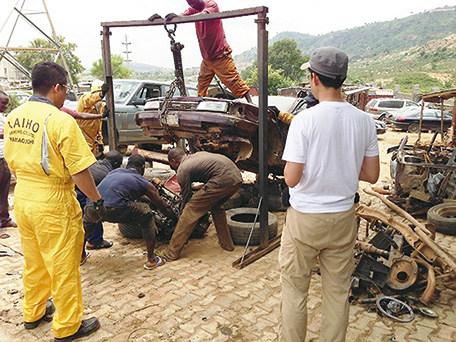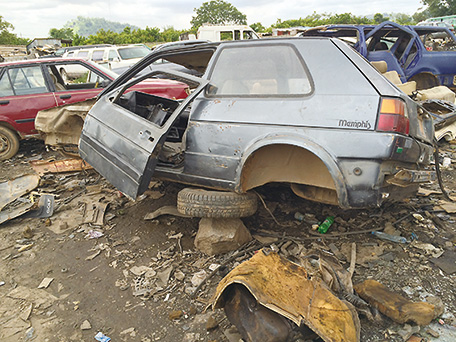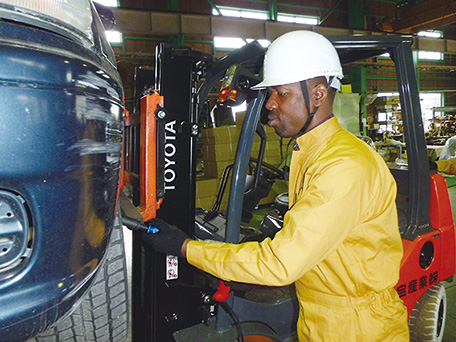Master Techniques, From Japan to the World - 6
Japanese recycling methods contribute to the improvement of the environment in Africa
– How an SME from Ishikawa Prefecture introduced eco-friendly automobile recycling in Nigeria

A Japanese staff teaching know-how of dismantling work in Nigeria. (Photo: Kaiho Sangyo Co., Ltd.)

A car scrap yard near Abuja, the capital city of Nigeria. (Photo: Kaiho Sangyo Co., Ltd.)
Nigeria is the most populous country in Africa, with approximately 170 million people. It is said that along with progress in motorization, the number of automobiles in the country has risen to over 10 million. A problem in Nigeria right now is that many of these automobiles are being left to rust in the road after breaking down, and these abandoned automobiles are causing traffic accidents, crime, and environmental degradation. These automobiles would be a new source of resources if they could be disassembled in an organized way and sorted piece by piece. However, there are no established waste processing methods in Nigeria that would allow people to do so. The techniques, facilities and equipment necessary for recycling are not well established.
That is where Kaiho Sangyo Co., Ltd. comes in. Kaiho Sangyo is a company based in Ishikawa Prefecture that recycles automobiles and exports their used parts. It is currently using the experience it has gained up until now in Japan to expand its automobile recycling business in Nigeria. But why Nigeria, and why now?
Kaiho Sangyo Executive Director Mr. Katsuya Baji explained the story, “Our company was visited by a delegation from United Nations Industrial Development Organization (UNIDO) in 2010. We heard about the abandoned automobile problem in Nigeria from the UNIDO's representative in the country, which at that time was a Japanese person. We started our project because we were then strongly requested that we expand into Nigeria. The goals of our business are to establish eco-friendly automobile recycling systems in the country and create jobs for local people.”
Thus, for approximately two years starting in 2012, Kaiho Sangyo collaborated with the environmental consulting company E-Square Inc. for a project that received support from JICA to carry out a Preparatory Survey for BOP Business Promotion1 towards the creation of an automobile recycling business in Nigeria using Japanese techniques. This survey used ODA to determine what was needed in order for Kaiho Sangyo – a company that had been exporting automobile parts to all over the world – to contribute to the industry and the environment in Nigeria.
“We investigated to the feasibility of establishing a business based on the Japanese-style automobile recycling business model in Nigeria. At the same time, we implemented training programs for staff members of local automobile repair unions in dismantling techniques. They had experience up to that point in removing and selling major parts like engines, but they didn't know about processes such as taking out the copper lines from inside doors for recycling. It can be dangerous to dismantle an automobile forcibly. We explained just how dangerous it was to try and dismantle parts by force, and emphasized the importance of safety and environmental-friendliness. They were surprised at how easy the work was once we taught them properly about the structure and order for the dismantling of automobiles.”
There are currently approximately 1.1 billion automobiles on the planet, and 350 million of those are said to have been produced by Japanese automakers. Behind the effort by Kaiho Sangyo to establish an automobile recycling business in Nigeria is the belief of the company's President Norihiko Kondo that “Japanese automobile waste should be cleaned up by Japanese people.” Japan developed many “arterial industries” that made different parts using various materials in the period of high economic growth after World War II. It also fostered “venous industries” to lessen the burden placed on the environment by those arterial industries through recycling and other efforts. Japan has had its own problems with environmental pollution and waste in the past and developed globally leading recycling techniques and venous industries. Japan has already had the experience of dealing with and overcoming the issues currently faced by developing countries, ahead of any other country. There is a lot that Japan can do to help developing countries addressing the issues that Japan once faced. Mr. Baji commented, “From now on we will be collaborating with government bodies in Nigeria, getting involved with technical training in the country, and developing an automobile recycling business that involves the poor.” Many expect this to be the first step in the promotion of sustainable growth in Nigeria that balances the development of venous industries with the protection of the environment.
*1 Surveys that consider and confirm the possibility of developing a business model, establishing a business plan, and launching a cooperative project with JICA based on the proposal of a Japanese company for a BOP business in a developing country. Projects are funded with up to a total of ¥50 million for a cooperation period up to three years.

A scene from a training held at the International Recycling Education Center (IREC) in Ishikawa Prefecture. (Photo: Kaiho Sangyo Co., Ltd.)
<< Previous Page Next Page >>
Main Text | Statictics and Reference Materials | Stories from the field | Master Techniques, From Japan to the World - | ODA Topics
